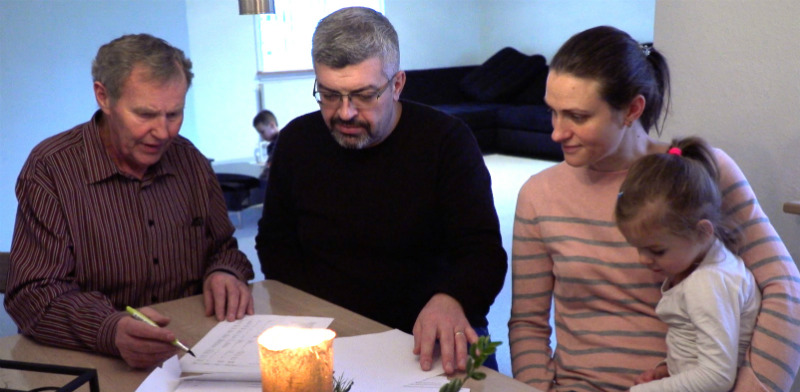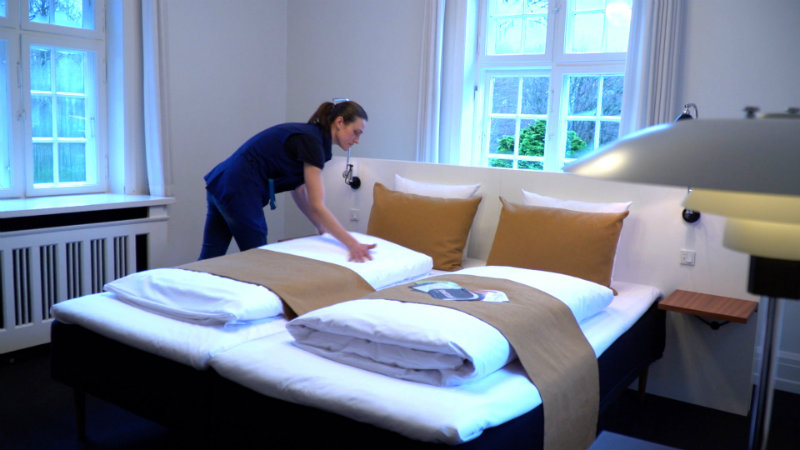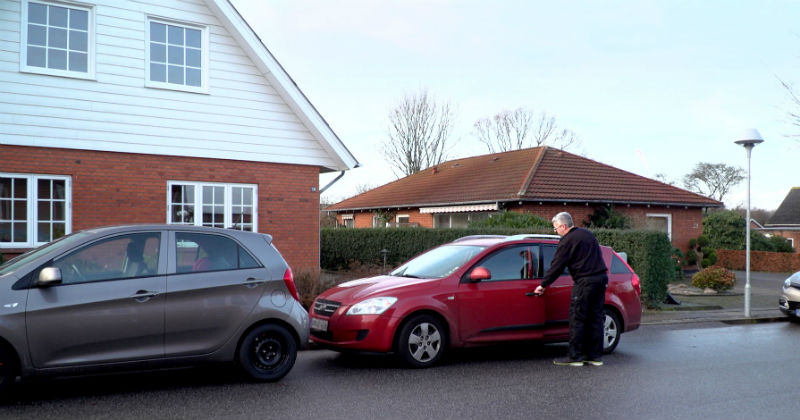Romanian Family:
We have been made very welcome
”We love our country, Romania, but we have also grown very fond of Denmark which has become our home,” says 37-year-old Sorin Ungureanu who - together with his wife, 37-year-old Ioana and their two children - find themselves so much at home that in the autumn of 2017 they bought the house of their dreams in Borris. Borris is a town with approximately 800 inhabitants in Ringkøbing-Skjern Municipality – geographically the biggest municipality in Denmark.
“We have been living here since 2011 and our children are fully integrated in the local community and gradually, so are we. We have been made to feel really welcome in this town. People gladly help us and we are very happy about living here,” Sorin says whilst simultaneously smiling at Erling Søndergaard - one of the passionate locals who likes to give a lending hand. Erling has helped the family with the purchase of their house, and as a friend of the family he joins our conversation as to why Sorin and Ioana came to Denmark and what it is like for a foreign family to move to Ringkøbing-Skjern Municipality.

Foto: Ralf Andersen
”We are also happy having you here. We can tell that you like being here, and you have also done a great deal to become a part of the community,” Erling points out referring to the fact that Sorin among others has been active in leading a father-child gymnastics team and a table tennis team in town.
”It is of course important that you do something yourself and show that you would like to join. This I keep telling other foreigners in this town and at work,” Sorin says, and explains how currently, he is trying to convince a Romanian colleague that he should take part in the upcoming Christmas lunch. However, his colleague doesn’t think his Danish is good enough to participate.
”But we all have a sense of community with each other at work, so of course, just like everybody else, we should be together at the Christmas lunch. It will also help us learn Danish,” Sorin says.

Foto: Ralf Andersen
Tempted by better wages and working conditions
The international financial crisis in 2008 is the actual reason why the little Romanian Ungureanu family has become a part of the local community in Borris. Like many countries, the crisis also struck hard in Romania, and Sorin lost his job as a manager in a big DIY store when it had to close. The future prospects with long working days and poor wages made him contact an old friend in 2010, who works in Denmark, to hear about the possibilities of a job here.
The working conditions are fine, wages are good and quality of life is good – except for the weather was the feedback from his friend, who immediately was given the task of finding Sorin a job.
He got a job in July 2010 at a big farm in Skarrild close to Kibæk – only 10 days after the couple had found out that Ioana was pregnant. They had been longing for a child ever since they married in 2004, so it was with some hesitations that Sorin left for Denmark. However, being apart and the wish to attend the birth also made Sorin go back to Romania after 6 months, but in the summer of 2011 he returned to Denmark. This time for a job at the pig farm of Dalagergaard in Borris. Ioana and little David followed 3 months later.

Foto: Ralf Andersen
Good Advice: Learn Danish from the beginning
“In the beginning we were only meant to stay here for a couple of years to save up some money, but then one year after another went by. And now we have bought this house,” Ioana explains. At first Ioana was at home taking care of David, but since 2012 she has been working as a cleaner at the Skarrildhus Hotel.
She likes her job, but her dream is to learn enough Danish to use her Romanian education. She holds a bachelor’s degree in biochemistry. Ioana is practising her Danish, but she regrets that she did not continue with the Danish classes. However, there were so many other things to do when she had just arrived in Denmark with little David, so she stopped after a few months. At work the opportunities of learning Danish are few, because her colleagues are also from abroad, eg. Thailand, Ukraine, and Germany.

Foto: Ralf Andersen
”It was also a mistake that I did not fully attend classes at the outset. I must improve my Danish if I am to use my bachelor’s degree in domestic animal science,” Sorin says.
“So I would also highly recommend this to other newcomers from abroad: Accept the offer of free language classes and don’t give up, even though it may seem difficult in the beginning where you are primarily focused on your new job. In order to become properly integrated here, it is so important to master Danish,” Sorin says. Today he speaks good Danish – though he is not quite satisfied yet. Therefore, he constantly practices Danish with his neighbours and colleagues, even though he can easily manage in English at work. He also has a language app on his mobile phone, so he can practice when time allows.
“However, my best teacher is this one,” Sorin says with a smile hugging 6-year-old David who speaks fluent Danish and is proud to teach his parents the Danish language.
“Mum, can we speak a little Danish, he also says to me when we are baking a cake together,” Ioana says.

Foto: Ralf Andersen
Borris welcomes newcomers
David has many friends in the town – both Danish and other nationalities. He has joined gymnastics and so has his younger sister Carina. David also plays football in the summer, and on top of that, he is really happy about having started school. David already knows what he wants to be when he grows up. He loves using his technical and mechanical skills, so he wants to become an engineer.
Actually, the whole town also appreciates that David attends the school – along with several other foreign children - ensuring that Borris will continue to have grades 0-6. There are 20 different nationalities in David’s class, with just under half being Danish. 3-year-old Carina is attending the nursery, Børnehuset, in Borris.
“We are very pleased that several Romanian families with young children have settled in town. We should like to preserve the town life of Borris, and the outlook would be gloomy without the newcomers,” Erling says. He has helped several Romanian families buy a house in Borris. In recent years 12-14 houses have been sold to Romanian families, and there are also Polish families who have purchased a house in the town.
“The school in Borris has 115 pupils, and it is important for the town that the numbers do not go down too much, as the limit for keeping the school is 75,” Erling explains.

Foto: Ralf Andersen
The Danes are friendly and patient
The Ungureanu family can point out a lot of things when talking about the positive sides of living in Denmark.
”Here people greet each other, even if you don’t know them, and everybody is nice and friendly. They like talking to us and are not so stressed. The Danes have a lot of patience when it comes to foreigners who are keen to learn new things in the workplace. This is very surprising and positive. They say “try again” if you make a mistake, even if it happens several times. That would never do in Romania. If you don’t master everything at once you will just get fired,” Sorin says. The couple also points out that the social conditions are much better in Denmark, and for instance you can always get positive help in the bank or from the Municipality.
Sorin himself has also benefited from the health care system and been helped by the municipal job centre, when he sustained a serious fracture on one of his ankles and had to call in sick for many months. It turned out that the doctors had forgotten a needle in his foot during the first operation, which consequently meant a long period of illness, which led him to losing his job at Dalagergaard, which he had had for four years as well as a career change, so Sorin is pleased with the help he received in connection with this. He was given permission to join Danish lessons during his period of illness and rehabilitation. He trained himself by means of his favourite sport - outdoor cycling and spinning.
Subsequently, he was assisted in getting a truck driver’s license and was a trainee for three weeks at a steam laundry before he landed a job with the electronics manufacturing services, GPV in Tarm through the JKS temp agency at the end of 2016. Here Sorin is now permanently employed working night shifts, but in line for changing to day shifts in 2019 when a colleague plans to retire.
He looks forward to this, as it will mean renewed time for leisure activities in Borris and more time to spend with Ioana and the children.

Foto: Ralf Andersen
Better working conditions and a good life for children
During the week they don’t see much of each other, because Ioana starts work early and Sorin leaves when she comes home. Yet they both agree on the improved working conditions and childhood conditions here compared to those of Romania.
In Romania Sorin would have had a 12-hour working day earning DKK 7,000 per month, and Ioana explains that in Romania she worked as a teacher 10 hours a day in three different workplaces earning about DKK 3,000 a month.
”So we would simply have to let the family take care of the children on weekdays spending time with them during weekends only,” says Ioana, who works 30 hours a week in Denmark and has plenty of time for the children at home as well as time for taking them to leisure activities in the afternoon. Yet the family’s finances are so healthy that they can afford their own house and two cars, which is also necessary in order for both of them to get to work. They have for example also just returned from a long holiday in their home country.

Foto: Ralf Andersen
FACTS
Ringkøbing-Skjern Municipality is geographically the biggest municipality in Denmark and has approximately 56,200 inhabitants, including 5,250 foreign citizens of 99 different nationalities. The biggest group of around 1.100 comes from Romania.
The railway town of Borris is located between Skjern and Herning and has about 870 citizens. In Borris there is day care, day nurseries, after-school care facilities, a school teaching grades 1 to 6.
For additional information about working and living in Ringkøbing-Skjern Municipality, please go to flytmodvest.dk: deutsch und english.